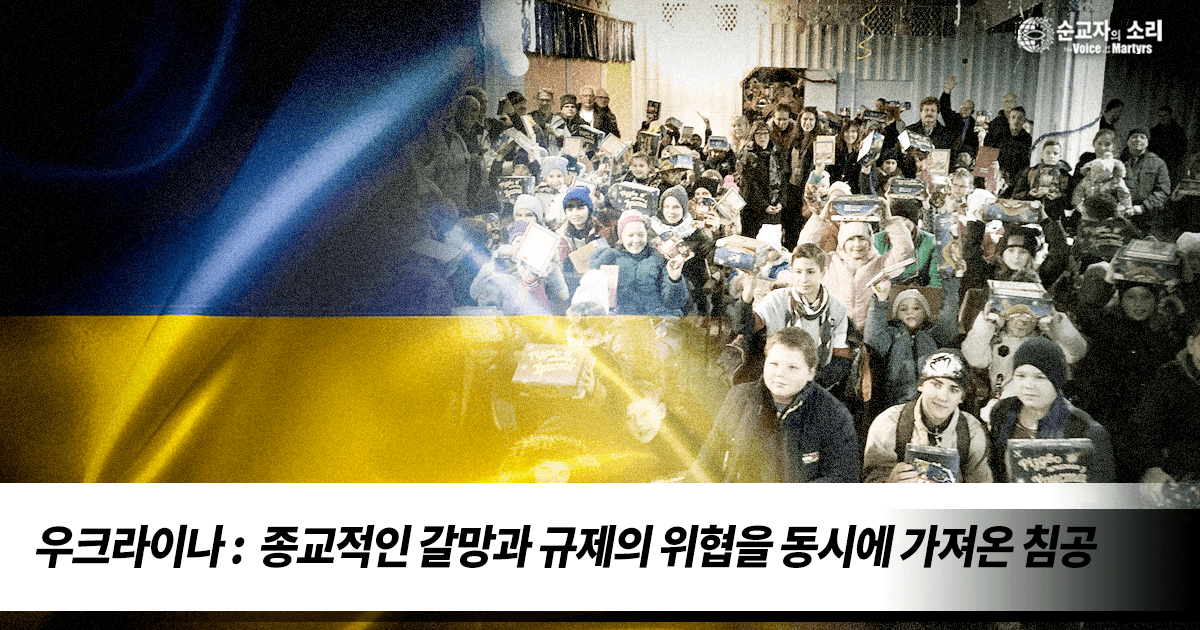
UKRAINE: INVASION BRINGS RELIGIOUS HUNGER, THREAT OF RELIGIOUS RESTRICTIONS
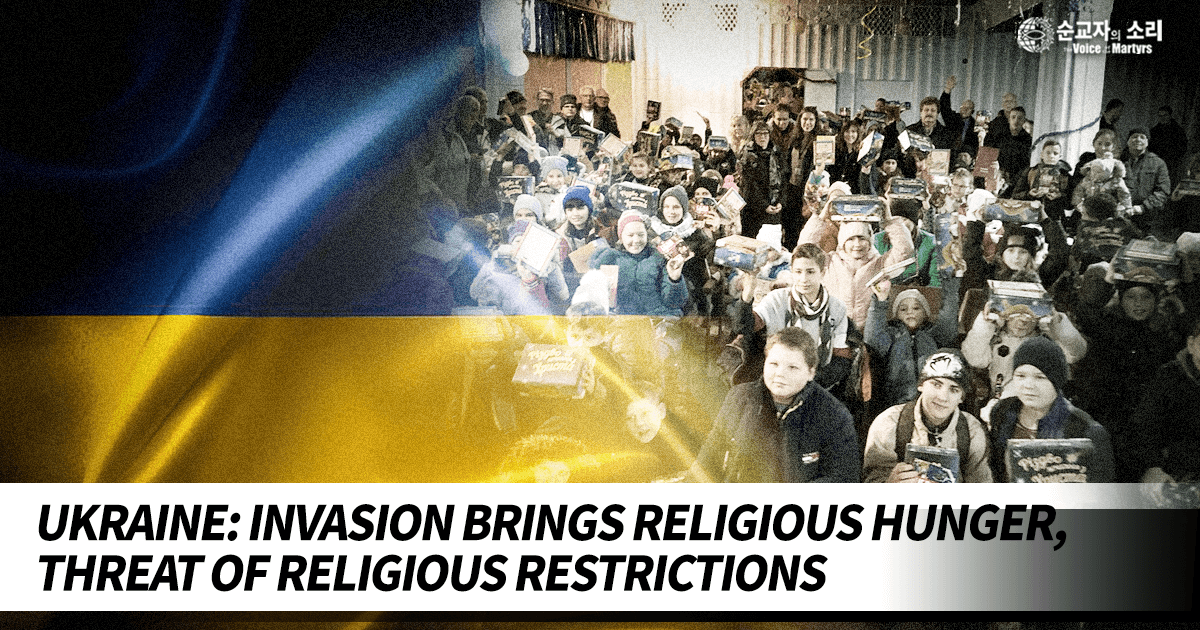
As the Russian invasion drags on, some Christians in Ukraine are literally taking their churches underground in an effort to survive missile and artillery attacks, while other Christians have little choice but to seek supplies and safety as temporary refugees in neighboring countries like Poland and Moldova. But according to Voice of the Martyrs Korea’s Representative Dr. Hyun Sook Foley, both groups of Christians are witnessing some common themes: an upsurge in religious hunger among their fellow Ukrainians, along with a concern that religious restrictions may soon prevent those hungers from being satisfied.
“Always during times of war, people search for hope as much as they search for food and shelter,” says Representative Foley. “The Ukraine Bible Society announced last week that they are nearly out of Bibles as a result of the upsurge of spiritual interest among ordinary Ukrainians. That’s why spiritual aid is as urgent to offer as physical aid to people whose lives are disrupted by conflict. Whether they’re refugees in a new country or residents in a bomb shelter, whether they’re Christian or atheist, people want more than bread and an Internet connection. They want someone to pray with them, cry with them, and help them try to make sense of all the death and destruction.”
Representative Foley says her organization is partnering with dozens of local Ukrainian churches, as well as Polish and Moldovan churches along the border with Ukraine, in cooperation with its sister organization, Voice of the Martyrs Poland. Representative Foley says that they are supplying both humanitarian and spiritual aid to Ukrainian Christians, as well as Ukrainians who are turning to local churches for help. Voice of the Martyrs Korea sent an emergency transfer of 10,000 USD last week to enable the local churches to immediately meet needs, and Representative Foley says they will send additional funds as future donations permit.
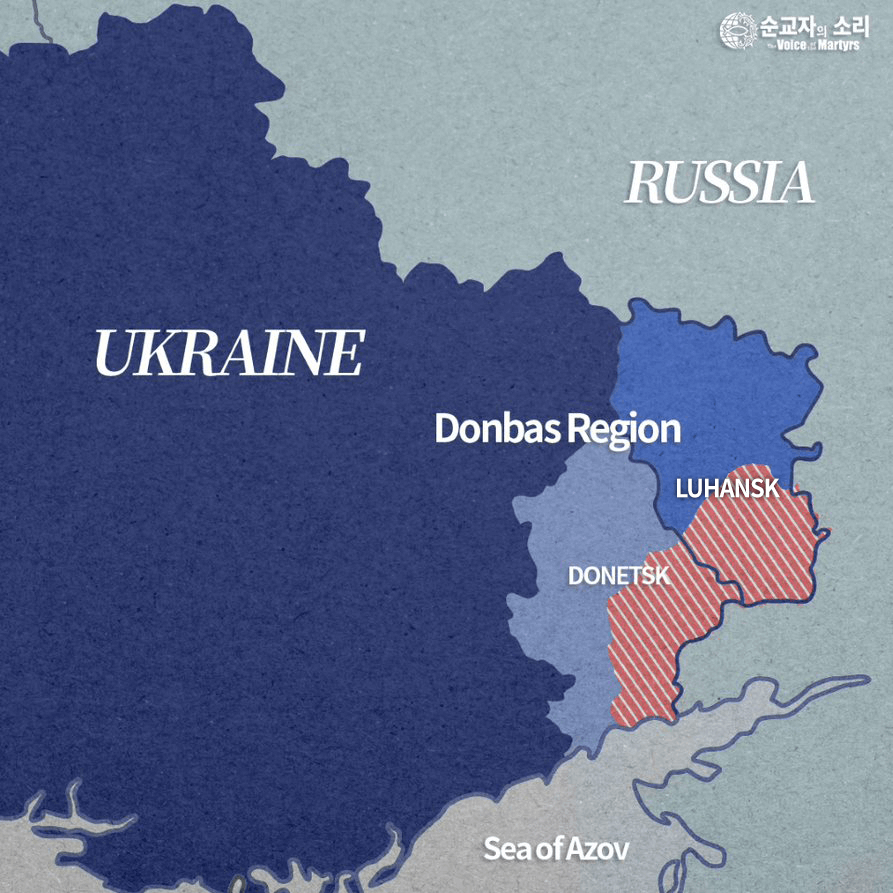
Eastern Ukraine, with the conflict zones of Luhansk and Donetsk indicated
Representative Foley says that though international media has not reported extensively on the religious dimension of the conflict, it is a subject of considerable discussion among ordinary Ukrainians. “Since Russia annexed Crimea in 2014 and pro-Russian forces took control of the Donbas region of Eastern Ukraine, Ukrainians have heard pro-Russian soldiers say they are fighting for a unified Orthodox state—a Russian Orthodox state.”
Representative Foley notes that Russia and Ukraine have by far the largest population of Orthodox believers of any two countries in the world, though a recent bitter split has placed the oversight of those believers under two different leaders and church structures, one loyal to Moscow and the other supported by most of the other Orthodox church bodies around the world.
Representative Foley notes that it is not only the autonomous Orthodox churches that the Russian and pro-Russian forces regard as enemies. Protestants, though they are comparatively small in number in both Ukraine and Russia, are also facing growing restrictions and difficulties. “Protestants are regarded as suspicious because they are rumored to be pro-American and pro-Western, funded and directed by outside forces hostile to the so-called ‘Russian Orthodox world’,” says Representative Foley.
Representative Foley says that when pro-Russian forces took control of the Donbas territory in Eastern Ukraine in 2014, it was natural for anti-Protestant suspicions to coalesce into anti-Protestant policies and laws, similar to ones implemented in Russia during the same period.
As a result, says Representative Foley, for Christians in Eastern Ukraine’s Donbas region, underground church life is already an everyday reality.
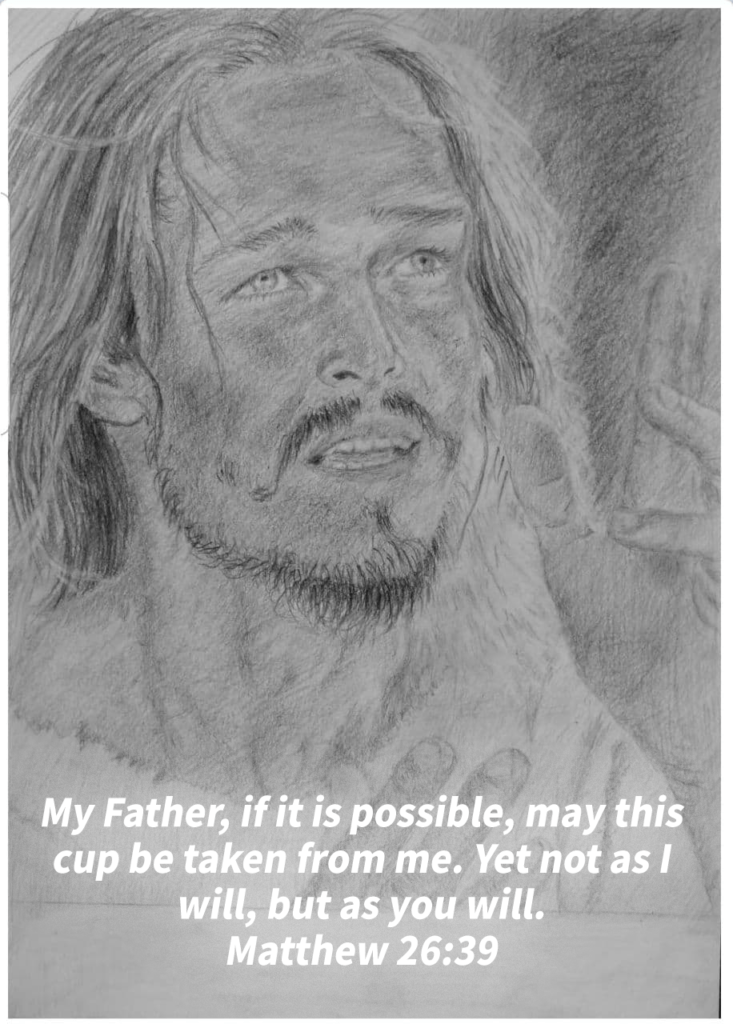
A drawing sent to Voice of the Martyrs Korea by Laila, one of its Russian language constituents in Kiev right before the city was besieged, as part of VOMK’s Prisoner Alert program for writing letters to Christians imprisoned for their faith.
“Christians in the so-called Donetsk and Luhansk People’s Republics have been underground for eight years already,” says Representative Foley. “When pro-Russian forces gained control over parts of the Donbas territory in Eastern Ukraine in 2014, they forced Protestant churches to re-register in order to obtain legal status, and, especially in the Luhansk region, they denied most of the re-registration requests. In both the Donetsk and Luhansk regions of Donbas they confiscated the Protestant church buildings, and in many cases those buildings are still in use today as barracks and command posts for the pro-Russian forces.”
Representative Foley says that the new constitutions of both the Donetsk and Luhansk People’s Republics give the discrimination against Protestant churches the force of law. “Both of the constitutions stipulate the Russian Orthodox Church as the ‘pillar’ of each respective republic,” says Representative Foley, “Both constitutions ban so-called religious ‘propaganda’ that would claim any other religion as ‘superior’ to Russian Orthodoxy.”
Representative Foley says that Protestant Christians across Ukraine are well aware of the restrictions the Donbas Christians face. She says they expect that they would be subject to the same restrictions in the event of a Russian victory in Ukraine. But Representative Foley says that Ukrainian Christians are inspired by the Donbas Christians and look to them as a model of how they can continue to be the church regardless of who is in control of the country.
“It would be a mistake to conclude that the loss of church buildings and legal status has crippled Protestant Christianity in the Donbas region, or that Christians across Ukraine look at Donbas and think their only hope is to flee Ukraine,” she says. “We sometimes wrongly assume that the apex of Christian development is found in external things: legal status, church buildings, pastors, and a strong public presence in the community. But if that’s the standard, then none of the churches in the New Testament meet it. Instead, scripture shows us that the apex of Christian development is not found in external things at all, but rather in internal things, namely, Christians being brought to full maturity in Christ, especially in the midst of persecution. That’s what we’ve seen in Donbas as well.”
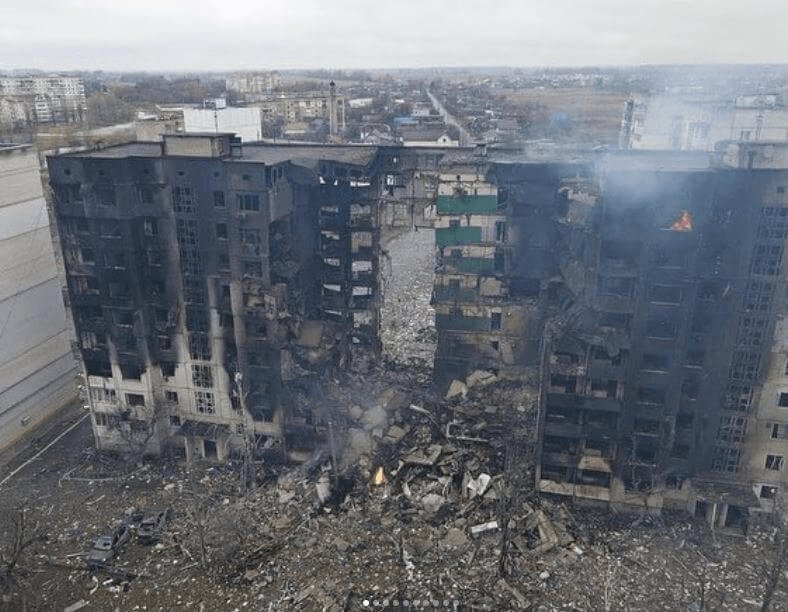
One of our Russian language Facebook (Голос Мучеников – Корея) subscribers sent us this photo of the city of Borodianka in the Kiev region.
Representative Foley says that many of the Donbas churches were involved in a Bible distribution project co-sponsored by Voice of the Martyrs Korea last year.
“Local Christians distributed 40,000 Action Bible New Testaments to children in conflict zones throughout Eastern Ukraine last year, in a project supported by a coalition of ministries including Voice of the Martyrs Korea, Voice of the Martyrs Canada, Mission Eurasia, and School Without Walls,” says Representative Foley. “Some people might say, ‘Who can distribute Bibles during a war?’ But the answer is: Local Christians can, and they must. Religious hungers are high, and 1 Peter 3:15 tells us that we must always be ready to give an account of the hope within us. And ‘always’ means even during a war.”
Representative Foley says Voice of the Martyrs Korea is in regular contact with a wide cross-section of Christians across Ukraine and now in neighboring countries where they are living as refugees, through its Russian language Facebook page. “Most local Christians are staying in Ukraine, and the ones who are leaving say they plan on coming back as soon as is practicably possible,” says Representative Foley.
Representative Foley says that even amidst the conflict and danger, Ukrainian Christians remain focused on their Christian mission. “One of our Facebook subscribers in Kiev, Laila, had been writing letters to Christian prisoners as a part of our VOMK Prisoner Alert project. As the war began and Kiev came under attack, she was concerned that she would not be able to mail the letters. So, she asked us to send her drawing to Christians in prison for their faith. We are including it here in response to her request.”
Representative Foley thinks the witness of the Donbas underground Christians has prepared and emboldened the Ukrainian church overall. “For eight years they’ve showed their brothers and sisters in the rest of Ukraine that it’s possible to be fully church, even when you don’t have a building or legal status, and even when you’re in the middle of a war zone,” she says.
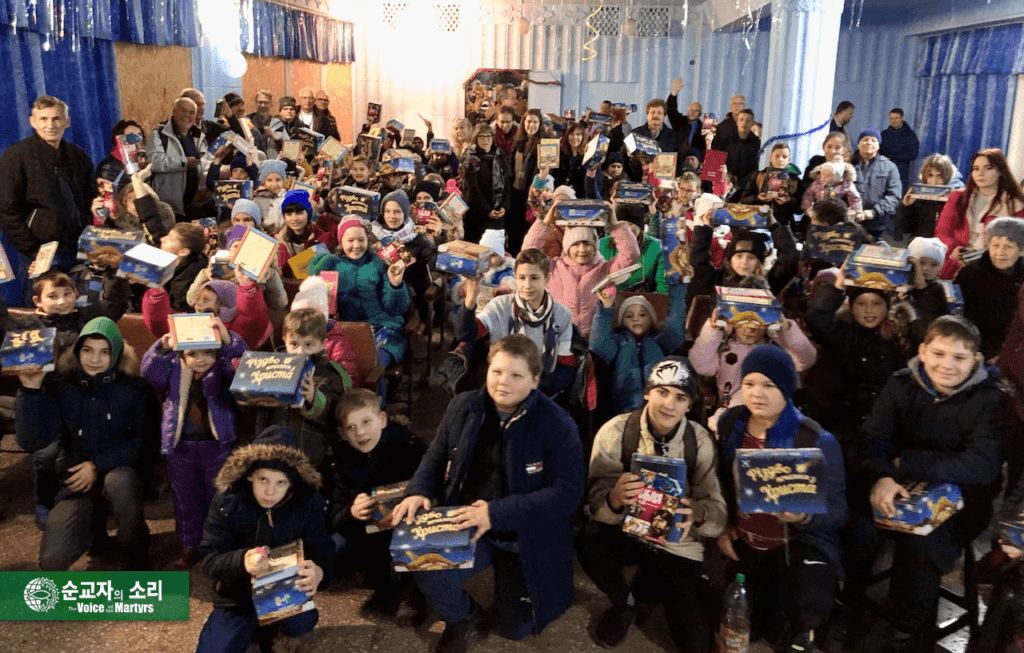
40,000 Action Bibles were distributed to Ukrainian children living in conflict zones in 2021.
Representative Foley says that the Ukrainian Christians in contact with her ministry pray for a Ukrainian victory but profess a faith that goes deeper than politics. “Part of the aid we are providing Ukrainian Christians, both inside Ukraine and in the refugee areas, is access to our Preparing for the Underground Church series, which was written in English and Korean but has been translated into Russian and made available for free online and through printed copies. It tells Christians how to take their churches underground.”
Representative Foley says her ministry has also made available to Ukrainian Christians the Russian translation of its book on underground North Korean Christians, called These are the Generations. “The Christian from Kiev who sent us the drawing for prisoners also wrote to us about this book right as her area of Kiev was facing bombardment. She said she had read it right before the war started. She wrote, ‘It was very interesting to learn how people live in North Korea, especially believers. What incredible challenges they face, how brave, hardworking and resilient they are. Praise God for the North Koreans.’ Christians in crisis are always encouraged by other Christians in crisis. So, in addition to providing the Ukrainian Christians physical bread, we are providing them with underground church spiritual ‘bread’ as well.”
Individuals interested in donating to the Ukraine Christian Emergency Relief project can give at www.vomkorea.com/en/donation or via electronic transfer to:
국민은행 (KB Bank) 463501-01-243303
예금주 (Account Holder): (사)순교자의소리
Please include the word “Ukraine” with the donation.

